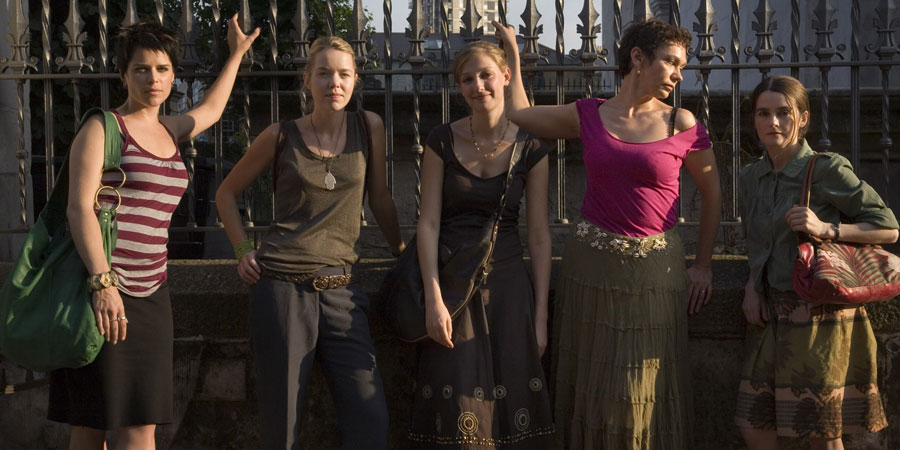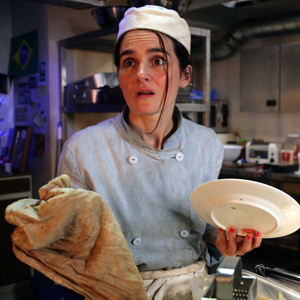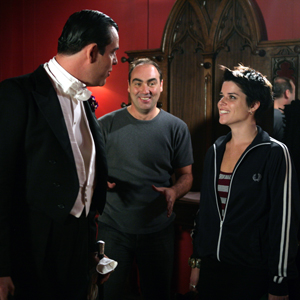About I Really Hate My Job


On a summer evening in London, Alice, a melancholic, aspiring writer in her 30s, is running late for her job as a kitchen hand at the Stella Bar, a ramshackle, disorganised café/restaurant in London's Soho. Once Alice arrives, Madonna, the gay, lovesick Maitre D, asks Alice if, for a small bonus, she could cook for the evening, as the regular chef is drunk.
Alice, who is very broke, reluctantly agrees. Meanwhile, we discover that the novel that Alice has been writing for years has been rejected by her agent for being a "saxophone solo of misery". One by one we meet the co-workers of the Stella Bar, as they work and talk together.
It is American waitress Abi's 30th birthday but the only person she tells is Alice, as she "needed to tell someone older". Abi, who is terrified of ageing, is late for her shift because her yoga teacher has died ("right in the middle of a downward dog"). She has also jut been dropped by her boyfriend, had her electricity cut off, and run out of money. An aspiring actress, she's just been offered a job in porn, which she is tempted to do for the money, despite having studied Ibsen and Chekhov, because it is 'art house' and the director is gay.
As the evening progresses, Abi gets drunk and angry, taking her frustration out on customers and co-workers alike. In particular she picks fights with Madonna. Already stressed as she fears her girlfriend is about to break up with her, Madonna finally cracks, accusing Abi of being self-centred.
Abi and Suzie, a young, angelic, possibly psychic, art student, constantly converse about love, porn, art, attraction, music, and the interest rates of credit cards. Suzie is dreamy and wise, and acts as a foil to Abi's fury and cynicism; she is also obsessed by singing star of the 1930s, Al Bowlly.
When Madonna takes a booking for the actor Danny Huston, Abi projects unreal expectations on what his arrival might do for her career.
Meanwhile in the kitchen, Alice is attempting, increasingly frantically, to impose order on a rat-infested, chaotic kitchen, while being interrogated by the Communist, Chilean dishwasher Rita about her sexual life and literary ambitions. Rita, we discover, is in equal parts wise and infuriating. As the night progresses, Alice and Rita fight, cry, laugh, dance to samba music and somehow cook for 40 people.
At one point, Alice breaks down, and admits to Rita that her book has been rejected. We also learn that Rita is leaving her husband to return to Chile to an old boyfriend who has finally got out of prison after serving time for gun-running, and has now opened a socialist bookshop. Rita talks constantly about the importance of the idea of possibility in life, while complaining to Madonna about the rats, which she sees as symbolic, and the fact that Madonna doesn't respect the workers in the restaurant.

In the restaurant, Madonna attempts to control the erratic waitressing skills of Suzie and Abi. She also attempts to hide from the customers the fact that a rat has blocked the bar's sink. When the rat is dislodged, to Abi's disgust, Madonna murmurs a Buddhist prayer over its bloated body.
The Danny Huston party finally arrives, but Danny is late. Mysteriously, his dinner companions are octogenarian musicians, one a triangle player. Abi grows increasingly impatient and insults them, and they leave. Abi then proceeds to argue with Madonna in the kitchen. Meanwhile, Danny Huston has arrived and left again, but Abi did not see him. Suzie informs Abi of this, much to Abi's distress.
As a result and now at the point of breakdown, Abi strips naked and demands advice about her future from the customers, most of whom leave without tipping. In a now empty restaurant, Madonna sacks Abi, who, as she turns to leave, runs into Danny Huston, who has returned looking for a lost libretto. He is dressed as a singing star of the 1930s; the lights dim and he sings the pre-war Al Bowlly hit Love is the Sweetest Thing.
The women are mesmerised; he then turns, and leaves, but not before tossing them a posy of fresh violets. Is he a ghost? An hallucination? His arrival and subsequent departure acts as a catalyst for the evening's emotions - as if witnessing something mysterious and beautiful has, on some level, liberated them. Madonna decides they can clean up tomorrow; as she locks up the restaurant Suzie suggests that they all (including, at the last minute Abi, who is finally humbled) go out in search of Bellinis - a cocktail concoction of peach and champagne. The film ends on a note of hope as the women leave the dark café and walk up the stairs of the basement venue towards the bright lights of Soho.
Evolution of the screenplay
Following years of waitressing in countless restaurants, writer Jennifer Higgie felt that she either needed to write a film about her experiences or shoot herself...

During her various restaurant experiences Jennifer encountered rude customers, famous customers and rats in the kitchen to name just a few. When she relayed all these stories to her brother Andrew, who worked in the media, they both decided that all the people she had met and the situations she had come across should be harnessed into a screenplay.
What emerged was an ensemble comedy set in a restaurant in London's Soho. Jennifer strongly believes that in every place she worked there was an amazing energy - people hated their jobs but they put up with it as they felt it was what they had to do to progress to achieve their dream and this is something which she wanted to portray.
"I Really Hate My Job." Who hasn't said it? A career. It's what happens when you lose control of a car on a wet road and it slams into a brick wall. You might assume they're just three waitresses, one cook and one dishwasher but they see themselves as an artist, an actor, a lover, an author and a philosopher.
The film was originally going to be titled Waiting as all of the woman, on this particular night and in their lives in general, are waiting for something (exciting) to happen.
I Really Hate My Job is most definitely comedic but there is something very moving and dramatic about it also. Director Oliver Parker comments on the fact that writer Jennifer Higgie has a great talent to write something which is laugh out loud funny one instant but then heart wrenching the next, rendering it so true to real life.
The addition of a movie star coming for dinner is quite surreal and adds an element of the unknown to the film - is it Danny Huston or Al Bowlly or is it not happening at all - have the stresses of the evening made the women hallucinate? What this sequence vividly suggests is that imagination and music provide solace in everyone's life.

